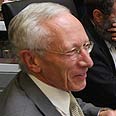
The Bank of Israel raised its key short-term borrowing rate by a quarter-percentage-point to 1 percent on Monday, its second increase since August in response to high inflation and signs the economy was rapidly recovering from a recession.
The move was a mild surprise since only six of the 15 economists in a Reuters poll had predicted a rate hike.
But consumer prices rose 0.2 percent in October from September to stand at an annual rate of 2.9 percent, up from 2.8 percent in September. Most economists expect the inflation rate to hit 4 percent in coming months before moderating.
At the same time, Israel's economy grew at an annualized 2.2 percent rate in the third quarter, fueled by rising exports and consumer spending. That follows a 1 percent increase in the second quarter.
After raising the key rate by a quarter-point in late August -- the first major central bank to do so -- Bank of Israel Governor Stanley Fischer held the rate steady in September and October on data showing inflation expectations near 2 percent in the next 12 months.
The Bank of Israel mentioned the following as the main considerations behind its decision:
- Inflation measured over the previous twelve months was 2.9 percent, and in the coming months is expected to be above the upper limit of the target range, although this is largely attributable to the effects of increases in tax rates and government controlled prices. However, one-year-forward inflation expectations increased moderately last month, and are in the upper part of the target range, even though they incorporate expectations of increases in the interest rate in the course of the next year.
- The decision to increase the interest rate for December by 0.25 percentage points will help to establish inflation one year ahead firmly within the target range, after the effects of the non-recurring government initiated price increases have passed.
- National Accounts data for the third quarter indicate recovery in economic activity, reflecting a significant increase in private consumption, exports and investments. The recent increase in Israel's exports is aided by the recovery of world trade.
- Interest rates of the leading central banks around the world are low, and are expected to remain so during the coming months. That said, the Fed and the ECB have started implementing steps that point to a gradual exit from the non-conventional aspects of monetary policy. In some countries where the recovery has become more firmly established interest rates have been increased.
"Israel’s economic indicators point to a recovery, but uncertainty persists regarding its strength. Even after this increase, the interest rate in December will be at the low level of 1 percent, continuing the accommodative monetary policy that is intended to support further economic recovery, particularly in light of the prevailing uncertainty, as well as placing inflation firmly within the target range," the bank said on its website.















